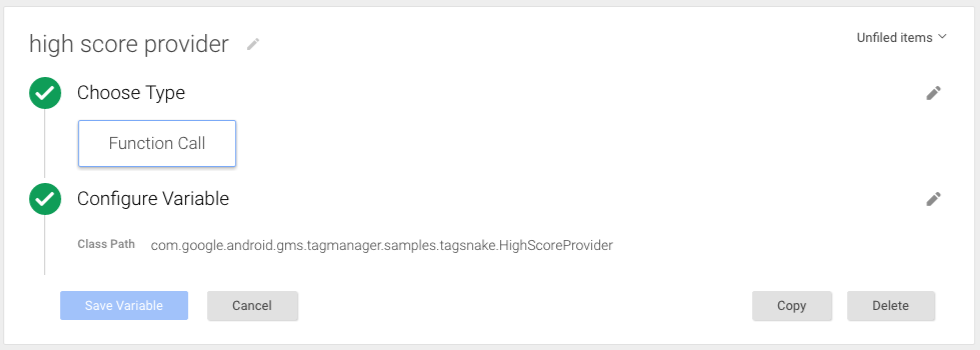Untuk memperluas fungsi Google Tag Manager, Anda dapat menambahkan variabel Panggilan Fungsi dan tag Panggilan Fungsi. Variabel Panggilan Fungsi memungkinkan Anda mencatat nilai yang ditampilkan oleh panggilan untuk fungsi yang telah didaftarkan sebelumnya. Tag Panggilan Fungsi memungkinkan Anda menjalankan fungsi pradaftar (misalnya, untuk memicu hit untuk alat pengukuran dan pemasaran ulang tambahan yang saat ini tidak didukung dengan template tag di Tag Manager).
Menambahkan tag dan variabel khusus
Untuk menambahkan tag khusus atau variabel khusus dengan Panggilan Fungsi:
Terapkan class yang memperluas
com.google.android.gms.tagmanager.CustomTagProviderataucom.google.android.gms.tagmanager.CustomVariableProvider:import android.support.annotation.Keep; import java.util.Map; @Keep public class HighScoreProvider implements com.google.android.gms.tagmanager.CustomVariableProvider { @Override public String getValue(Map<String, Object> map) { synchronized (HighScoreProvider.class) { return ((Long)sHighScore).toString(); } } private static long sHighScore = 0; public static void recordScore(long score) { synchronized (HighScoreProvider.class) { sHighScore = Math.max(score, sHighScore); } } }Jika Anda menggunakan ProGuard, pastikan nama dan metode class tidak di-obfuscate. Gunakan anotasi Keep untuk menentukan hal ini.
Di antarmuka web Google Tag Manager, gunakan nama class yang sepenuhnya memenuhi syarat untuk menyiapkan tag dan variabel:
